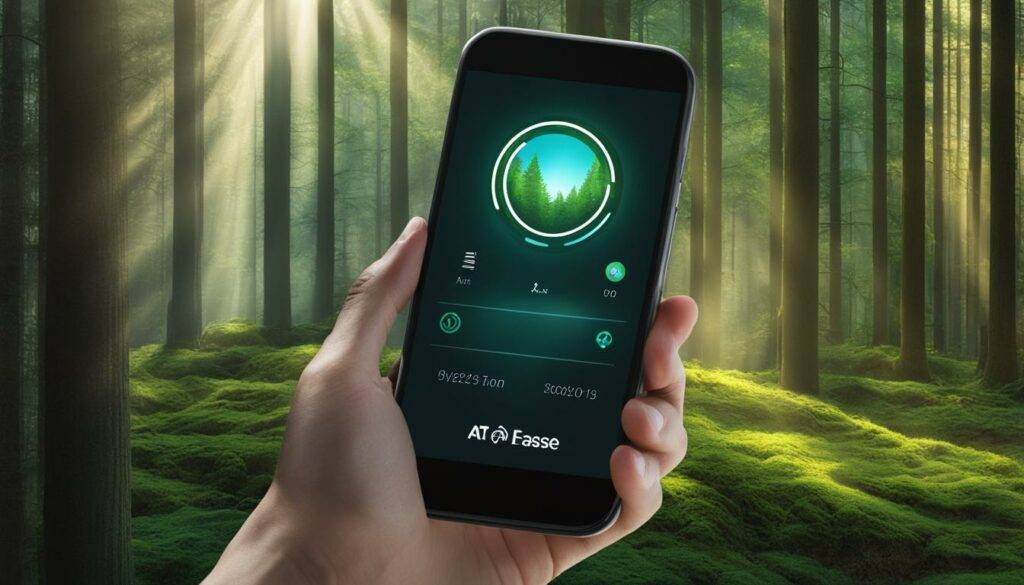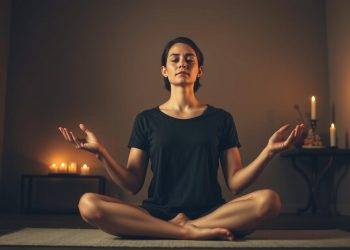Anxiety is a common experience that can significantly impact your daily life. The constant worry, racing thoughts, and physical discomfort can be overwhelming. But there is a way to find tranquility amidst the chaos.
Guided meditation for anxiety relief offers techniques and practices to help you manage and alleviate anxiety symptoms.
Now, you might be wondering, what exactly is guided meditation? It’s a practice that involves a trained meditation guide leading you through a series of calming exercises, helping you focus your mind and achieve a state of deep relaxation.
Guided meditation for anxiety is designed to bring calmness and peace to your life, allowing you to find inner solace and overcome anxious thoughts and feelings.
By incorporating guided meditation into your routine, you can experience the profound benefits it offers. Not only does it reduce stress and anxiety, but it also enhances self-awareness and promotes overall well-being.
It’s a powerful tool that can transform your relationship with anxiety, giving you the tools to manage it effectively and find relief.
Key Takeaways:
- Guided meditation for anxiety relief offers techniques and practices to manage and alleviate anxiety symptoms.
- It involves a trained meditation guide leading you through calming exercises and deep relaxation.
- Guided meditation reduces stress and anxiety, enhances self-awareness, and promotes overall well-being.
- By incorporating guided meditation into your routine, you can transform your relationship with anxiety and find relief.
- Take the first step towards tranquility and peace by exploring the world of guided meditation for anxiety relief.
Understanding Mindfulness and Meditation for Anxiety
Mindfulness and meditation are powerful practices that can help alleviate anxiety and promote a sense of calmness and peace in your life. By being fully present and aware of the present moment, mindfulness allows you to reduce stress and increase self-awareness.
Meditation, on the other hand, involves focusing the mind and achieving a deep state of relaxation.
Both mindfulness and meditation can be effective tools for managing anxiety. By practicing mindfulness, you can learn to observe your thoughts and emotions without judgment, allowing you to let go of anxious thoughts and cultivate a sense of inner peace.
Meditation, on the other hand, helps to quiet the mind and release tension, allowing you to relax and reduce anxiety symptoms.
There are various techniques that can be used in mindfulness and meditation for anxiety relief. Deep breathing exercises, body scan meditations, and guided visualizations are just a few examples. These practices help to activate the body’s relaxation response and shift your focus away from anxious thoughts.
By incorporating mindfulness and meditation into your daily routine, you can develop a greater sense of calmness, reduce anxiety symptoms, and improve your overall well-being.
The Power of Guided Meditations for Anxiety
Living with anxiety can be challenging and overwhelming. The constant racing thoughts, the tightness in your chest, the feeling of being on edge—it can all take a toll on your mental and emotional well-being. That’s where guided meditations come in.
Guided meditations for anxiety and stress have gained popularity for their ability to provide a sense of calm and relief. These structured and guided experiences help you relax and let go of anxious thoughts and feelings, allowing you to find inner peace and tranquility.
One of the key benefits of guided meditations is that they offer a structured approach to anxiety relief. With the help of a trained meditation guide, you are led through various techniques and practices that promote relaxation and reduce anxiety symptoms.
Whether it’s focusing on your breath, visualizing peaceful scenes, or engaging in body awareness exercises, guided meditations provide a roadmap to achieving a state of deep relaxation.
Research has shown that guided meditations can have a significant impact on anxiety relief. Studies have found that regular practice of guided meditation techniques can reduce symptoms of anxiety and stress, improve mood, and enhance overall well-being.
By incorporating guided meditations into your daily routine, you can build resilience and develop skills to manage anxiety more effectively.
When it comes to finding the best guided meditation for anxiety, it’s important to choose a method that resonates with you. There are various guided meditation apps, programs, and resources available that offer different styles and approaches.
It’s worth exploring different options to find the one that suits your needs and preferences. Remember, finding relief from anxiety is a journey, and guided meditations can be a powerful tool to support you along the way.
The Benefits of Guided Meditations for Anxiety:
- Reduces anxiety symptoms and promotes relaxation
- Provides a structured approach to anxiety relief
- Improves mood and overall well-being
- Enhances self-awareness and resilience
- Offers different styles and approaches to suit individual needs
Techniques for Deep Relaxation in Guided Meditation
When it comes to managing anxiety, deep relaxation techniques play a crucial role in guided meditation. These techniques are designed to help you let go of stress and induce a state of deep calmness and tranquility.
By incorporating practices such as focused breathing, guided visualizations, and body awareness exercises, you can experience profound relaxation that eases anxiety symptoms.
One technique commonly used in guided meditation for anxiety is focused breathing. This involves consciously directing your attention to your breath, taking slow, deep breaths, and releasing tension with each exhale.
By focusing on your breath, you create a sense of grounding and centering, allowing anxious thoughts to fade away and promoting a state of relaxation.
Another powerful technique is guided visualization, where a meditation guide helps you create vivid mental images that promote relaxation and calmness.
Through the use of descriptive language and storytelling, guided visualizations transport you to peaceful and serene environments, allowing your mind to escape from the pressures of daily life and find respite from anxiety.
Body awareness exercises are also commonly incorporated into guided meditations for anxiety. These exercises involve bringing your attention to different parts of your body and consciously releasing tension and stress held within.
By cultivating a heightened awareness of your body and intentionally relaxing each muscle group, you can promote deep relaxation and alleviate anxiety symptoms.
Table: Techniques for Deep Relaxation in Guided Meditation
| Technique | Description |
|---|---|
| Focused Breathing | A technique that involves directing attention to the breath, taking slow, deep breaths, and releasing tension with each exhale. |
| Guided Visualization | A technique where a meditation guide uses descriptive language and storytelling to create vivid mental images that promote relaxation and calmness. |
| Body Awareness Exercises | Exercises that involve bringing attention to different parts of the body and consciously releasing tension and stress held within. |
By incorporating these techniques into guided meditation for anxiety, you can experience a profound sense of relaxation and relief.
Whether you choose to follow guided meditation sessions or practice these techniques on your own, deep relaxation can bring you closer to a state of inner peace and tranquility, helping you manage anxiety and cultivate overall well-being.
Research on the Benefits of Guided Meditation for Anxiety
Anxiety is a common mental health condition that can significantly impact our well-being. Luckily, there is growing research supporting the use of guided meditation as an effective technique for managing anxiety.
Studies have shown that incorporating mindfulness and meditation into our daily routine can help reduce symptoms of anxiety and improve overall mental health.
Research on anxiety meditation techniques highlights their ability to calm the mind, reduce stress, and promote a sense of inner peace.
A study published in the Journal of Clinical Psychology found that a mindfulness-based meditation program significantly reduced anxiety symptoms in individuals with generalized anxiety disorder (GAD).
Another study conducted at Stanford University showed that mindfulness meditation can activate brain regions associated with emotional regulation and reduce anxiety levels.
These findings underline the potential of guided meditation for anxiety relief. By practicing anxiety meditation techniques, such as deep breathing, body scan, and visualization, individuals can cultivate a sense of calmness and tranquility.
The key is to engage in regular practice and find a guided meditation program or app that suits your needs and preferences.
Benefits of Guided Meditation for Anxiety:
- Reduced anxiety symptoms
- Improved overall mental health
- Enhanced emotional regulation
- Promotion of inner peace and tranquility
With the growing body of research supporting the benefits of guided meditation for anxiety, it’s clear that incorporating this practice into your daily routine can have a positive impact on your mental well-being.
Whether you choose to practice mindfulness-based stress reduction (MBSR), mindfulness-based cognitive therapy (MBCT), or other anxiety meditation techniques, the key is to find a practice that resonates with you and commit to regular practice.
| Study | Findings |
|---|---|
| A study published in the Journal of Clinical Psychology | A mindfulness-based meditation program significantly reduced anxiety symptoms in individuals with generalized anxiety disorder (GAD). |
| A study conducted at Stanford University | Mindfulness meditation can activate brain regions associated with emotional regulation and reduce anxiety levels. |
Guided meditation offers a powerful and accessible approach to managing anxiety. By incorporating mindfulness and relaxation techniques into your daily routine, you can experience a greater sense of calmness and well-being. Remember to find a guided meditation program or app that suits your needs and commit to regular practice to reap the full benefits.
Mindfulness-Based Stress Reduction (MBSR) for Anxiety
When it comes to managing anxiety, Mindfulness-Based Stress Reduction (MBSR) is a highly effective program that combines mindfulness and meditation practices. Developed over 40 years ago by Jon Kabat-Zinn, MBSR has been shown to reduce symptoms of anxiety and promote overall well-being.
MBSR incorporates supported teachings, mindfulness practices, and movement practices to help individuals work with the stresses of everyday life. By cultivating self-awareness and changing the relationship with negative mind states, MBSR offers a unique approach to anxiety relief.
Research has demonstrated the positive impact of MBSR on anxiety reduction. A study published in the Journal of Anxiety Disorders found that individuals who participated in an MBSR program experienced a significant decrease in anxiety symptoms.
Another study published in the Journal of Psychotherapy and Psychosomatics showed that MBSR was as effective as medication in reducing anxiety symptoms.
“The MBSR program has been transformative for me. It has given me the tools to manage my anxiety and be more present in my everyday life. I highly recommend it to anyone struggling with anxiety.” – Sarah, MBSR participant
The Benefits of MBSR for Anxiety
- Reduces anxiety symptoms
- Promotes relaxation and calmness
- Increases self-awareness
- Enhances resilience in the face of stress
- Improves overall well-being
MBSR provides individuals with practical techniques to cultivate mindfulness and navigate anxiety with greater ease. By incorporating MBSR into your daily routine, you can experience the transformative power of mindfulness and meditation in managing anxiety and finding greater peace of mind.
Mindfulness-Based Cognitive Therapy (MBCT) for Anxiety
Mindfulness-Based Cognitive Therapy (MBCT) is a transformative program that combines mindfulness and cognitive therapy techniques to provide effective relief for anxiety.
It is specifically designed to help individuals manage recurring thoughts and negative patterns that contribute to anxiety and prevent depressive relapse. By cultivating awareness and changing the relationship with these thoughts, MBCT offers a unique approach to anxiety relief.
In MBCT, mindfulness practices such as meditation and breathing exercises are integrated with cognitive therapy strategies. These practices help individuals become more aware of their thoughts and emotions, and develop a non-judgmental and compassionate attitude towards themselves.
Through this process, individuals can learn to respond to anxiety triggers in a more constructive and healthy way.
Research has shown that MBCT is highly effective in reducing symptoms of anxiety and preventing relapse. A study published in the Journal of Consulting and Clinical Psychology found that MBCT significantly reduced anxiety levels in patients with anxiety disorders.
Another study published in the British Journal of Psychiatry found that MBCT reduced the risk of depressive relapse in individuals with a history of depression and anxiety.
“MBCT has helped me gain a deeper understanding of my anxiety and taught me how to relate to it differently. I have learned to observe my thoughts without judgment and respond to them with compassion. This has made a significant difference in my ability to manage anxiety and live a more fulfilling life.”
MBCT can be practiced in a group setting or individually with the guidance of a trained therapist. It offers a structured and evidence-based approach to anxiety relief, empowering individuals to take control of their mental health and well-being.
Through the integration of mindfulness and cognitive therapy, MBCT provides a holistic and empowering path towards anxiety relief and long-term resilience.
Key Benefits of MBCT for Anxiety:
- Reduces symptoms of anxiety
- Prevents depressive relapse
- Cultivates awareness and self-compassion
- Provides effective coping strategies for anxiety triggers
- Promotes overall well-being and resilience

The Impact of Guided Breathing Meditations on Anxiety
Guided breathing meditations are a powerful technique for managing anxiety and promoting a sense of calmness and relaxation. These meditations encourage individuals to focus on their breath, taking deep, intentional breaths to create a sense of inner peace.
By incorporating guided breathing meditations into your daily routine, you can reduce anxiety symptoms and find relief from worry and stress.
Research has shown that just 10 minutes of mindfulness meditation, including guided breathing, can have a significant impact on anxiety levels. By directing your attention to your breath, you can quiet your mind and release tension in your body.
This simple yet effective practice allows you to ground yourself in the present moment, letting go of anxious thoughts and bringing a sense of tranquility to your being.
“The guided breathing meditations have been a game-changer for me. Whenever I feel overwhelmed by anxiety, I turn to these meditations to find my center again. The deep breathing helps me release tension and brings me a sense of calmness that I didn’t think was possible. I am so grateful for this practice.”
One of the key benefits of guided breathing meditations is their accessibility. Whether you’re a beginner or an experienced meditator, you can easily incorporate these practices into your daily life.
There are numerous apps and online resources that offer guided breathing meditations specifically designed to alleviate anxiety. These meditations provide step-by-step guidance and soothing voiceovers to help you navigate through the practice.
| Benefits of Guided Breathing Meditations for Anxiety | How It Helps |
|---|---|
| Promotes Relaxation | Guided breathing meditations help activate the body’s relaxation response, promoting a state of deep relaxation and calmness. |
| Reduces Stress | The intentional focus on the breath in guided breathing meditations helps to calm the mind, reducing stress and anxiety. |
| Improves Focus | By directing your attention to the present moment, guided breathing meditations enhance your ability to concentrate and stay focused. |
| Enhances Self-Awareness | Through the practice of guided breathing, you develop a greater sense of self-awareness, recognizing the sensations and emotions within your body. |
Incorporating guided breathing meditations into your daily routine can be a transformative way to manage anxiety and bring more peace into your life. Take a few moments each day to slow down, focus on your breath, and embrace the stillness within.
By making guided breathing a regular practice, you can experience the profound benefits it offers for anxiety relief and overall well-being.
At Ease App: A Comprehensive Anxiety Relief Program
The At Ease app is a comprehensive anxiety relief program that offers guided meditation techniques and tools to help individuals manage and alleviate anxiety. Designed to provide deep and lasting anxiety relief, the app combines guided breathing meditations and journaling exercises to promote relaxation and reduce worry.
The app offers a customizable experience with the option to choose from voice, music, or nature sounds for the background. This allows users to create a personalized and soothing environment that enhances their meditation practice.
With a focus on breathwork, the guided breathing meditations target shallow and constricted breathing, helping individuals find pleasure in breathing and reduce anxiety.
One of the unique features of the At Ease app is its emphasis on long-term changes rather than temporary solutions. By incorporating journaling exercises, individuals can explore their thoughts and emotions, gaining insights into their anxiety triggers and developing strategies for managing them.
This holistic approach helps individuals build resilience and cultivate a greater sense of calmness and well-being.
| Features | Benefits |
|---|---|
| Guided breathing meditations | Promotes relaxation and reduces anxiety |
| Customizable experience | Allows users to create a soothing environment for meditation |
| Journaling exercises | Helps individuals explore their thoughts and emotions, providing insights into anxiety triggers |
| Long-term relief | Fosters lasting changes and builds resilience for overall well-being |

With positive testimonials highlighting the effectiveness of the guided breathing meditations and the app’s soothing qualities, the At Ease app has become a trusted resource for individuals seeking anxiety relief. Users have reported improved focus, reduced panic attacks, and a greater sense of calmness and well-being.
Whether you are new to meditation or have an established practice, the At Ease app can be a valuable tool in managing anxiety and promoting a greater sense of calmness and tranquility in your life. Download the app today and begin your journey towards anxiety relief.
Testimonials and Success Stories
Discover the power of guided meditation for anxiety relief through these inspiring testimonials and success stories from users of the At Ease app.
| User | Experience |
|---|---|
| Emily | “The guided breathing meditations in the At Ease app have been a game-changer for me. I used to struggle with constant worry and anxiety, but now I feel a sense of calm and peace. The app’s soothing voice and relaxing music help me unwind and let go of stress. I highly recommend it to anyone looking for anxiety relief.” |
| Mark | “I’ve been using the At Ease app for a few months now, and I can’t believe the difference it has made in my life. The guided breathing meditations have helped me reduce panic attacks and improve my focus. I feel more grounded and in control of my anxiety. It’s truly been a lifeline for me.” |
| Sarah | “As someone who has struggled with anxiety for years, finding the At Ease app has been a blessing. The guided meditations have taught me how to quiet my mind, relax my body, and find inner peace. I now have the tools to manage my anxiety and live a more balanced life. Thank you, At Ease!” |
These testimonials reflect just a few of the countless success stories that the At Ease app has generated. Users have reported improved mental well-being, reduced anxiety symptoms, and a greater ability to cope with life’s challenges.
The app’s holistic approach to anxiety relief, combining guided breathing meditations and journaling exercises, has proven to be a powerful combination for many.
If you’re seeking relief from anxiety, consider trying the At Ease app and experience the transformative effects of guided meditation for yourself. Join the community of users who have found peace, calmness, and a renewed sense of well-being with this innovative anxiety relief program.
Conclusion
Guided meditation is a transformative practice that can bring immense relief to those experiencing anxiety. By incorporating techniques such as mindfulness, deep relaxation, and guided breathing meditations, you can find solace and tranquility amidst the chaos of daily life.
Through the power of guided meditation for anxiety relief, you can cultivate a greater sense of calmness and inner peace. The structured and guided nature of these meditations provides a clear path to navigate through anxious thoughts and emotions, allowing you to release tension and embrace relaxation.
Whether you choose to explore guided meditation through dedicated programs, meditation apps, or personal practice, the benefits are undeniable. Guided meditation has the potential to reduce anxiety symptoms, improve focus, and enhance overall well-being.
By dedicating time to this practice, you are taking an active step towards reclaiming control over your mental health and enhancing your quality of life.
FAQ
What is guided meditation for anxiety?
Guided meditation for anxiety is a technique that involves listening to a trained meditation guide who leads you through a structured meditation practice aimed at alleviating anxiety symptoms and promoting relaxation.
How does mindfulness help with anxiety?
Mindfulness helps with anxiety by reducing stress, increasing self-awareness, and promoting a sense of calmness. By being fully present and aware of the present moment, mindfulness can help alleviate anxious thoughts and feelings.
What is the difference between meditation and mindfulness?
Meditation involves focusing the mind and achieving a deep state of relaxation, while mindfulness is the practice of being fully present and aware of the present moment. Both meditation and mindfulness can be used to ease anxiety and promote relaxation.
Can guided meditation for anxiety really help?
Yes, guided meditation for anxiety can be an effective tool for managing anxiety. Research has shown that practicing mindfulness and meditation can reduce anxiety symptoms and improve mental health.
What is Mindfulness-Based Stress Reduction (MBSR)?
Mindfulness-Based Stress Reduction (MBSR) is a program that incorporates mindfulness and meditation practices to reduce stress and anxiety. It helps individuals work with the stresses of everyday life and cultivate a sense of calmness and resilience.
How does guided breathing meditation help with anxiety?
Guided breathing meditation encourages individuals to focus on their breath and engage in deep, relaxed breathing. By practicing guided breathing meditations, individuals can reduce anxiety by promoting a sense of calm and relaxation.
What is the At Ease app?
The At Ease app is a comprehensive anxiety relief program that incorporates guided breathing meditations and journaling exercises. It aims to provide deep and lasting anxiety relief by making long-term changes rather than offering temporary solutions.
Can guided meditation really relieve my anxiety symptoms?
Yes, guided meditation has been found to be effective in relieving anxiety symptoms. Many users have reported improved focus, reduced panic attacks, and a greater sense of calmness and well-being after practicing guided meditation.
How do I incorporate guided meditation into my routine?
You can incorporate guided meditation into your routine by setting aside a specific time each day to practice. You can use apps like At Ease or join guided meditation classes to get started and establish a regular meditation practice.
Is guided meditation suitable for everyone?
Guided meditation can be beneficial for most individuals, but it is always recommended to consult with a healthcare professional if you have any underlying medical conditions or concerns.




























































